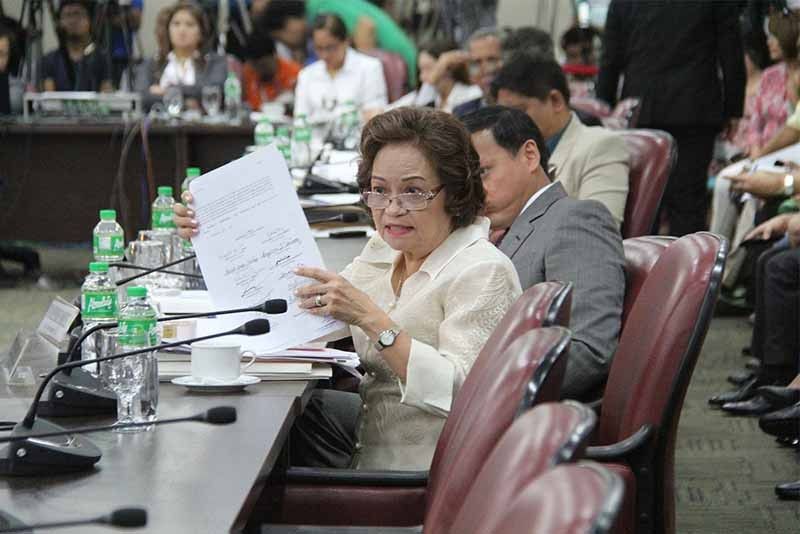File quo warranto case vs De Castro, Solicitor General urged

MANILA, Philippines — A private citizen yesterday urged the Office of the Solicitor General (OSG) to also challenge the qualification of Associate Justice Teresita de Castro to sit in the Supreme Court.
Jocelyn Marie Acosta sent a four-page letter to Solicitor General Jose Calida asking him to initiate a quo warranto case against De Castro, as the OSG has done against Chief Justice-on-leave Maria Lourdes Sereno.
There was no immediate comment from De Castro, an arch critic of Sereno.
“As a citizen of this country and a taxpayer, I humbly request that the Solicitor General urgently initiate quo warranto proceedings against Associate Justice Teresita Leonardo-de Castro for lacking integrity as a member of the Supreme Court (SC),” Acosta said in her letter.
Calida had acted on the letter of citizen Eligio Mallari on Feb. 21. Mallari, a lawyer who was suspended by the SC, questioned the authority of Sereno as chief magistrate.
Sereno took an indefinite leave of absence while facing a separate ouster move before Congress seeking her impeachment.
De Castro, on other hand, was among the justices who appeared before the impeachment hearing and volunteered that Sereno’s apparent non-submission of all her statement of assets, liabilities and net worth (SALN) means she should not have been considered for the post of chief justice.
De Castro was a candidate for chief justice at the time Sereno was appointed to the top judiciary post.
The Judicial and Bar Council (JBC) required all applicants for chief justice from government to submit all their previous SALNs until Dec. 31, 2011.
De Castro reportedly claimed that only 10 SALNs were required, but the JBC allegedly announced that “all previous SALNs” must be submitted by applicants for the chief justice vacancy in 2012.
But since many applicants were unable to comply, the JBC waived the requirement for applicants to file all their SALNs.
Acosta believed it was within the right of the JBC to waive the requirement, saying “the JBC could do so because the submission of SALNs is not a constitutional requirement but a JBC requirement which the JBC can waive.”
“This waiver benefited both Chief Justice Sereno and Justice De Castro,” she argued.
JBC records would show that De Castro only submitted her SALNs for 15 years when in fact she has been in government service from 1973 and should have submitted 39 SALNs.
She has been working in government for 40 years, starting in February 1973 as law clerk at the Office of the Clerk of Court, Acosta said.
“Justice De Castro appears to have perjured herself before the House justice committee when she openly accused the Chief Justice of not complying with the JBC’s SALN requirement, all the while knowing that the SALN rule was waived by the JBC, from which Justice De Castro herself benefited,” she said.
Following the logic used by Mallari, in the case of De Castro since she also did not submit all her SALNs, she allegedly employed deception in claiming that she complied with the SALN requirement.
“Thereby lacking integrity and is not qualified to sit as Justice of the Supreme Court,” Acosta said.
On the other hand, Calida asked the SC to declare Sereno’s appointment as null and void and remove her as Chief Justice.
Calida submitted an 81-page quo warranto memorandum yesterday urging the high court to judge Sereno with the same yardstick used on other public officials.
He said the SC “should now choose between placing respondent on equal footing with other public servant and applying the law with a firm hand, or placing her on a pedestal and giving her special treatment.”
“She can be measured by the same yardstick. Among the obligations imposed on public officers by the Constitution, Republic Act No. 3019 (Anti-Graft and Corrupt Practices Act), and RA No. 6713 (Code of Conduct and Ethical Standards for Public Officials and Employees) is the annual filing of the SALNs,” Calida said. – With Marvin Sy, Robertzon Ramirez
- Latest
- Trending






























